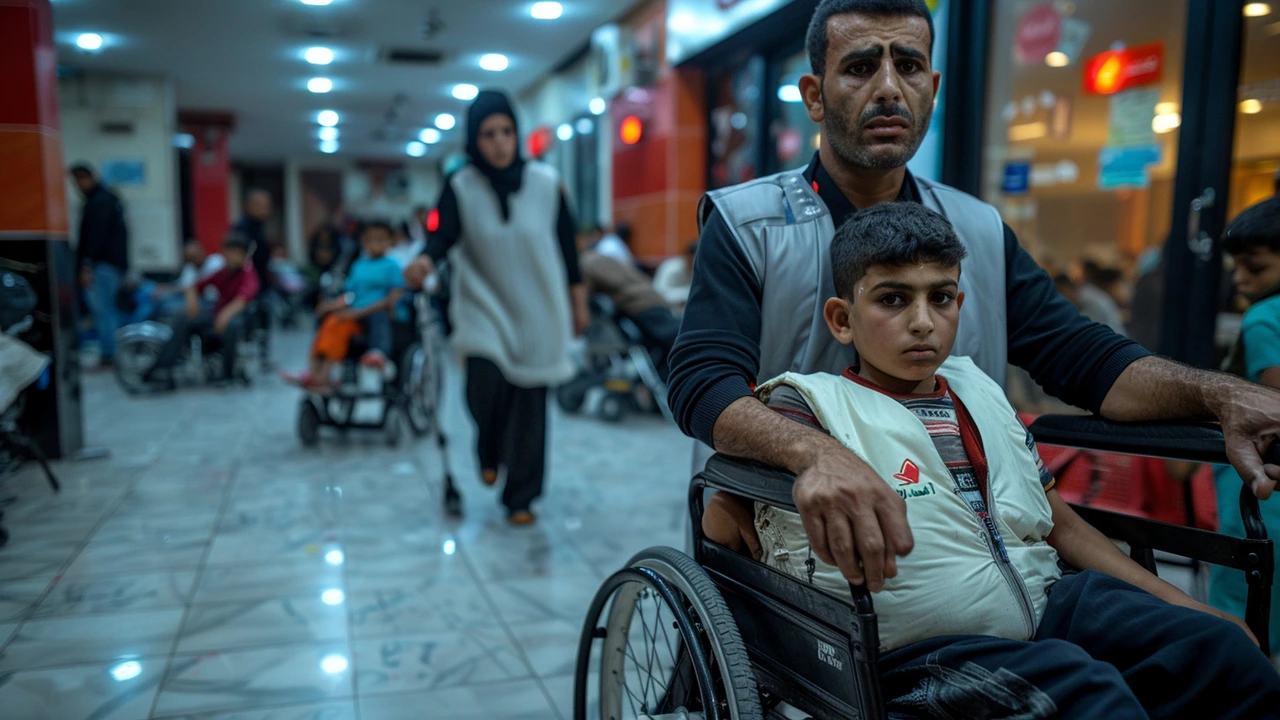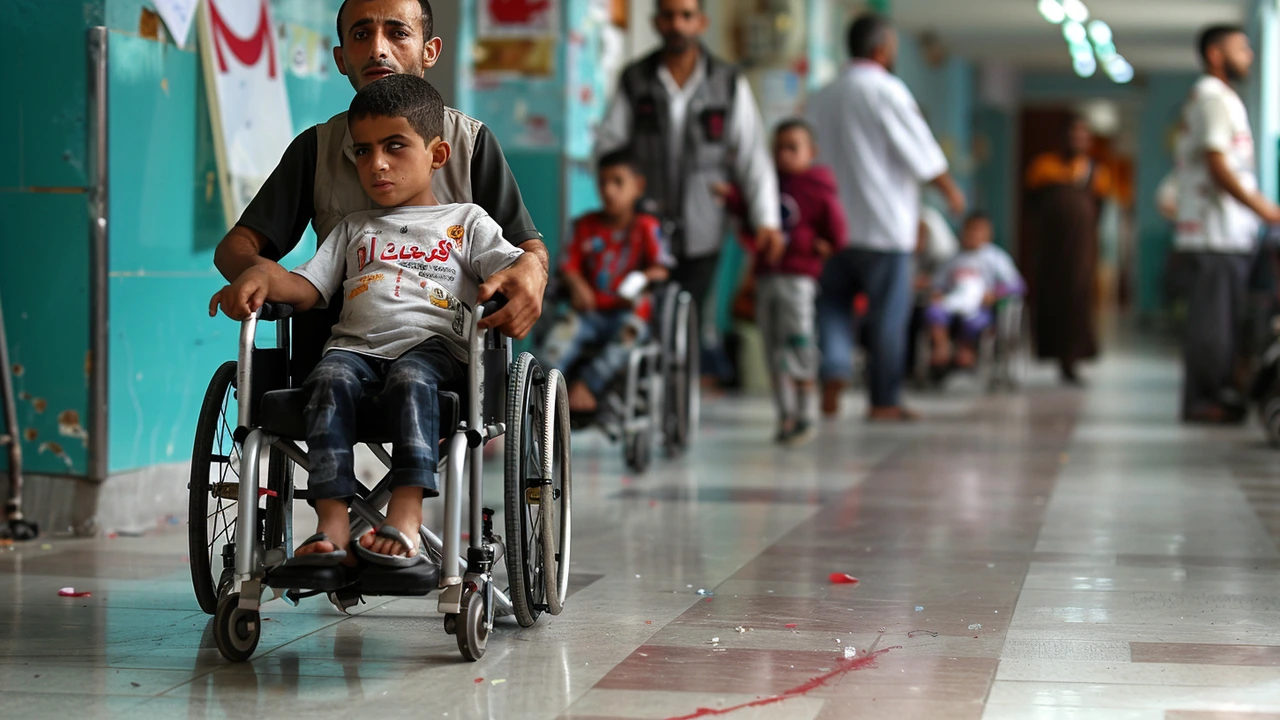
Escalating Violence Leaves Rafah in Dire Medical Crisis
The Gaza Strip, long a flashpoint of conflict, has entered an even more desperate phase as Israeli military strikes target crucial healthcare facilities. The damage inflicted on hospitals in Rafah has plunged the region into an unprecedented medical emergency, highlighting the severe human cost of the escalating violence. The Indonesian Field Hospital and the Kuwaiti Speciality Hospital, both integral to Rafah's healthcare system, have become the latest victims in this troubled region.
Indonesian Field Hospital
The Indonesian Field Hospital, a cornerstone of Rafah's medical infrastructure, suffered severe damage to its upper floors during recent Israeli strikes. This facility has been a lifeline for many residents in need of urgent medical care. The loss of critical hospital space adds insurmountable pressure on the already strained medical staff struggling to attend to an overwhelming influx of patients. The attack underscores a troubling trend of targeting healthcare services, severely limiting access for those in life-threatening situations.
Healthcare workers, under immense stress, continue to manage the increasing number of casualties, but the damage to the hospital means fewer beds, limited operating space, and a severe shortfall in medical supplies. Such conditions are unsustainable and place patients' lives at greater risk, hampering efforts to save lives amid the chaos.
Kuwaiti Speciality Hospital's Closure
Tragically, the Kuwaiti Speciality Hospital has been forced to close its doors after two medical staff members were killed just outside the hospital gates by Israeli forces. Dr Suhaib al-Hams, the hospital's director, emphasized that the relentless attacks by Israeli forces around the hospital and the broader military operation necessitated this tragic decision. The closure signifies not only an attack on the medical personnel but also a stark denial of critical medical services to hundreds of needy patients.
This hospital, which was treating 249 wounded from previous attacks, is now out of commission, deepening the healthcare crisis in Rafah. Dr Mohammed Tahir, an orthopaedic surgeon, expressed deep concern over this closure, noting that it not only jeopardizes patients’ lives but also symbolizes a profound collapse of medical care in the region. The immediate effect has been a shift in medical responsibilities to al-Mawasi, where a field hospital is not yet fully operational, further complicating the delivery of essential health services.
Ambulances and Supply Disruptions
The humanitarian toll does not end with hospital closures. The destruction has severely hampered ambulance services, with quadcopters restricting their movement, making the transportation of the injured to functional medical facilities increasingly difficult. These disruptions mean that many patients, especially those requiring urgent care, may not get the help they need in time, increasing the fatality rate from treatable injuries.
In central Gaza, the situation at Al-Aqsa Martyrs Hospital is equally dire, as fuel supplies have been blocked by Israel. Without fuel, life-saving equipment and medical devices sit idle, exacerbating the healthcare crisis. Medical facilities across the Gaza Strip face similar threats, compounded by the blockade preventing essential supplies from reaching their destinations.
A Broader Collapse of Gaza's Health Infrastructure
Since October 7, 24 hospitals in the Gaza Strip have experienced damage, destruction or military occupation. These facilities, previously part of a fragile healthcare network, are now either destroyed or partially functioning, operating under severe constraints. Only six out of Gaza's 36 hospitals currently provide any level of service. This systematic degradation of healthcare infrastructure profoundly impacts the civilian population, who now face even greater hurdles in accessing medical care.
The blockade on lifesaving supplies hampers efforts to treat the injured and manage chronic illnesses. Shortages of critical medicines, surgical equipment, and everyday medical supplies create an untenable situation for healthcare workers and volunteers striving to meet the needs of the population. The international community's calls for ceasefires and humanitarian corridors often seem futile in the face of such entrenched and escalating violence.
International and Humanitarian Reactions
Global organizations and leaders have expressed grave concerns over the ongoing attacks on healthcare facilities. They call for immediate action to protect civilians and medical personnel and to allow unfettered access to humanitarian aid. The World Health Organization (WHO) and various NGOs have repeatedly called for healthcare neutrality in conflicts, emphasizing that medical facilities should not become battlegrounds. Yet, the ground reality in Gaza paints a starkly different picture.
Many argue that these attacks are not just collateral damage but part of a broader strategy to break the civilian population's resilience. The loss of medical facilities cripples the community's ability to care for its members, fostering despair and further destabilizing the region. International pressure and diplomatic efforts must intensify to bring a halt to these atrocities and to restore some semblance of normalcy and hope.
The Human Cost
For Rafah's residents, the targeting of hospitals represents a devastating blow. Each hospital closure and every medical professional's death signifies a ripple effect of suffering and loss. Families facing medical emergencies now have nowhere to turn, exacerbating their trauma. Children, the elderly, and the chronically ill are alarmingly vulnerable in such conditions, with nowhere safe to seek refuge or medical attention.
The psychological impact of these attacks is immeasurable. Constant fear and anxiety permeate daily life, as the threat of violence and the loss of essential services create an environment of perpetual crisis. Mental health professionals, already scarce, are overwhelmed, unable to provide the necessary support to a population caught in the crossfire. Long-term societal impacts will be felt for generations, as the current humanitarian disaster leaves deep scars on the collective psyche of Gaza's residents.

Conclusion
The escalation of violence and the targeted destruction of medical facilities in Rafah is a tragic chapter in the ongoing conflict in Gaza. The dire situation underscores an urgent need for international intervention to protect civilians and healthcare workers, and to ensure that essential medical services can reach those in desperate need. Without immediate action, the human toll will continue to rise, deepening a humanitarian crisis that demands a compassionate and swift response from the global community.